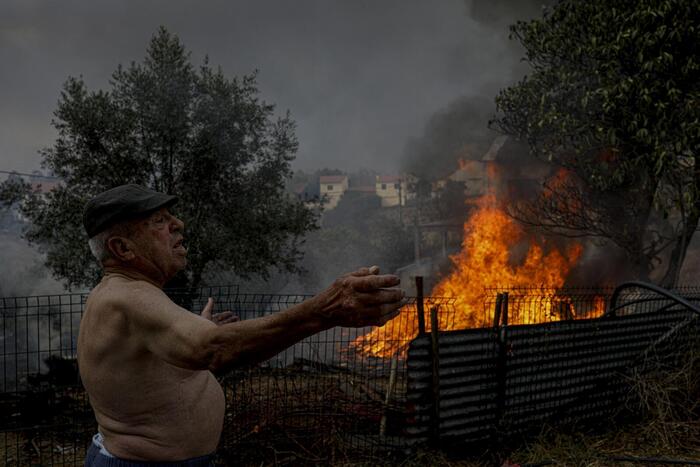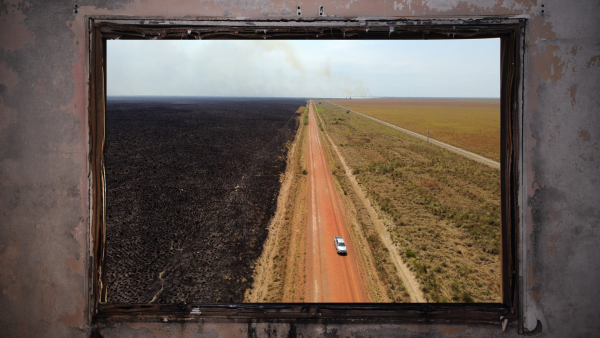Wildfires have ravaged several regions across the world this summer, from California to Morocco, Spain, Portugal, France, Germany, Italy, and Greece, triggering questions over its impact on the already struggling global economy.
Even though Climate Change experts have been warning us of the severe consequences of global warming on our planet, we still get surprised every time temperatures spike to record highs or wildfires spread through regions visited for the first time. Climate phenomena are becoming more frequent and intense than ever, whether it is the extreme snow storms in the winter or severely high temperatures in the summer.

A resident reacts as he sees his property on fire in Mogadouro in Ourem on July 13, 2022. The fire that has been raging since the end of last week in part of the Santarem district restarted, helped by the exceptionally high temperatures, after being temporarily contained on July 11. The Santarem region was expecting record temperatures of 46 degrees, the highest in the country. (Photo by PEDRO ROCHA / AFP)
According to the United Nations Environment Programme, wildfires are expected to rise by 50% by 2100, if no sufficient action is taken on a global level to tackle climate change as soon as possible.
By mid-July 2022, at least 35,700 wildfires in the United States have impacted about 4.8 million acres have been reported by the US Congressional Research Service, which points to a serious issue that could have irreversible damage not only to our environment but also to the global economy.
8 Ways Wildfires Are Harming the Global Economy
1- Real estate
It should not be surprising the wildfires destroy millions of acres which consists of villages and towns, where people lose their homes, schools, and businesses. Even after fires are contained, raging fires tend to damage properties' value for years to come.
2- Agricultural Production
Much of the lands impacted by wildfires have major agricultural potential, whether in terms of plant growth or animal farming, which means that thousands of farmers lose their source of livelihood, negatively impacting food security and their country's GDPs.
3- Insurance Companies
If we are talking about damaged properties, then we must not forget about the overwhelming losses recorded by insurance companies that have to handle piling numbers of cases, to help clients adjust to losing housing, businesses, vehicles, and possibly losses in life.
4- Tax Revenues
When wildfires leave crippling losses among residents, countries can only expect tax revenues to plummet as a result of individuals' loss of income, which could have devastating consequences on fiscal budgets and economic growth.
Not to mention the growing need for government aid programs to relieve individuals affected by fires.
5- Travel Disruptions
Here is another way the global economy is hit by wildfires. When fires erupt through regions for several days or weeks, travel agencies halt all trips to, from, or through affected areas, which means an endless series of travel disruptions and acute financial losses.
6- Tourism
Along with travel disruptions, countries where wildfires devastate green spaces sought by tourists at the finest seasons no longer attract the same number of tourists, which negatively affects the tourism and hospitality industries in those areas.
7- Wildlife
Another significant loss resulting from wildfires is the increasing danger of extinction not only of rare species but whole ecosystems, which could have a long-lasting impact on food security and the production of many valuable commodities.
8- Healthcare
Finally, air pollution caused by wildfires has enduring consequences on individuals living in affected and nearby areas, from eye and respiratory tract irritation to more serious conditions such as affecting lungs, bronchitis, heart, and asthma.
Health systems that have to attend to spikes in such cases, treating patients and offering support for prolonged periods can by costly for governments in affected countries.









